Movie Review: Chunhyang
by refresh_daemon
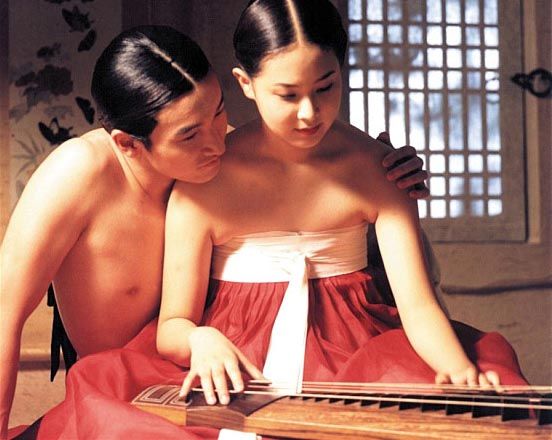
![]()
Director Im Kwon-taek‘s Chunhyang is a notable film for many reasons. Principally, it is perhaps the most formalistically adventurous works from the director, nearing his hundredth film. It is also one in a long line of adaptations of the Joseon-era pansori, “Chunhyangga,” perhaps one of the best known and most widely appreciated traditional folk story-songs in Korea.
The legend of Chunhyang has a long reach in the Korean arts: in addition to continuing performance by pansori artists even today, the story has been adapted into written, drawn and cinematic media, including over a dozen feature film adaptations. Furthermore, the story continues to inspire tertiary works like the television drama Delightful Girl Chun-hyang as well as cinematic narrative deconstructions like The Servant.
Hailing originally from 17th or 18th century Joseon, Chunhyangga is a story that bears some similarities to Shakespeare’s Romeo and Juliet because of a forbidden romance and secret wedding. However, the story itself is more of a protest against the perversion of Confucian ideals into an unjust class system and abuse of power, having been conceived under the strict hierarchical Confucian-influenced Joseon society, a five-century-long dynasty that is the direct predecessor to modern Korea. And perhaps because the strains of hierarchical Confucian-inspired culture continue to affect Koreans to this day, the story of Chunhyang remains popular to this day.
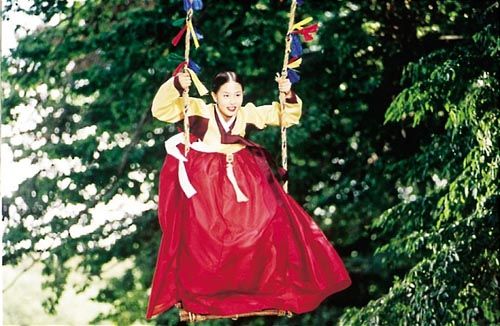
The titular Chunhyang (Lee Hyo-jeong) is a daughter of a courtesan and a governor. Because only being the offspring of two nobles in Joseon society gave you noble status and courtesans were considered peasant servants, despite their court skills, Chunhyang herself is of the servant class. While normally even being the illegitimate offspring of a noble would afford Chunhyang and her mother Wolmae (Kim Seong-nyeo) some benefit and comforts, he passed away, leaving the pair to their own devices.
But the story actually begins from the viewpoint of the present governor’s son, Lee Mongryong (Jo Seung-woo), a studious, talented, and earnest, if arrogant, youth. One day, he gets permission to take a day trip and heads off to a pavilion for inspiration when he spies Chunhyang on a swing and approaches her as a courtesan. But having been raised by her mother like a noble, despite her lowly status, she resists him and demands that he marry her and promise eternal fidelity if he truly desires a relationship with her. Won over by both her intellect and beauty, he consents to an instant marriage, but in secret because of possible disowning by his parents.
As the newlyweds engage in post-nuptial affections, their relationship is put to the test when Mongryong’s father is promoted to the king’s cabinet in Seoul. Mongryong cannot take Chunhyang with him because if his marriage to a peasant is discovered, he will be disowned, leaving him a vagabond. So he promises that he will study hard for three years and pass the royal examination, gaining a position in the king’s government, and then return for Chunhyang.
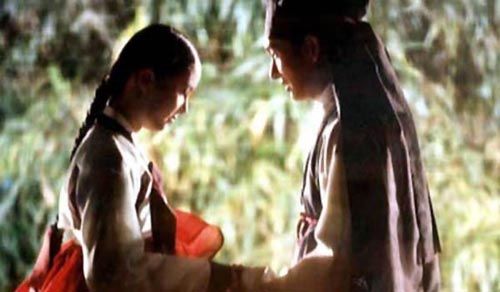
Unfortunately, after a bitter farewell, a new governor (Lee Jeong-hun) arrives and desires Chunhyang, whose beauty is renowned in Namwon, and orders her to submit to him as a peasant should to a noble. However, Chunhyang rebels, affirming her duty as a wife to remain faithful to Mongryong and questioning why Governor Byun would ask her to break the one of the five major Confucian relationships. Enraged by her throwing the very fundamentals on which his whole power rests in his face and by her intelligent defiance, he orders her beaten and sentences her to death.
Meanwhile, Mongryong passes the government test with highest marks, becomes the king’s emissary and is sent back to Jeolla province, where he left Chunhyang three years ago, to report on the state of the kingdom in the guise of a vagabond noble, arriving in Namwon on the eve of Governor Byun’s birthday celebration and Chunhyang’s execution.
The story itself is clearly a criticism of the abuse of power by the noble class, especially as we see Byun and his chief officials use their power for selfish gain while Mongryong reaffirms the basis of the system by claiming that the officials and Byun were supposed to use their power to benefit the whole populace rather than for personal gain. Along the same lines, the story also critiques the separation of the classes as well, making the listener root for the cross-class relationship between the two.
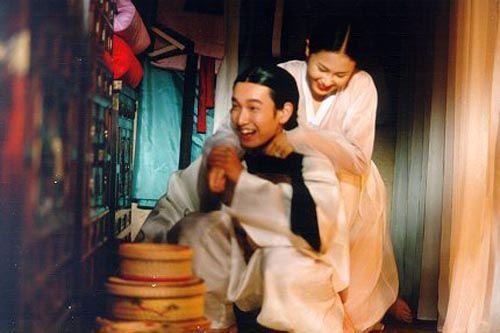
It’s not a complicated story and it’s obvious why regular folk, both in the past and now, have an appreciation for the story as it speaks to the abuse of power of the elite at the expense of the average person, both on an individual and class level. At the same time, the story retains some rather patriarchal modes of thinking, including the value of female chastity, the place of a woman as a daughter, wife and mother before an individual, as well as not criticizing Mongryong’s aggressive behavior when it comes to his initial interaction with Chunhyang, eventually making Chunhyang a damsel in distress.
But for the times, this story was probably still a bit of a provocative statement, given the power of the class system of the time, and it makes sense that such criticism came from the folk form of pansori over some courtly writing.
For Im Kwon-taek, the choice to make a film about this classic tale is appropriate given his deep art-film exploration of traditional Korean culture starting in the 1980’s and especially given his enormous success with his previous pansori film, Sopyonje. And Chunhyang, being one of the most beloved of the surviving pansori epics, is an obvious choice for him.
But for Im, it wasn’t enough just to relate the tale of Chunhyang as it had been done too many times before, so instead he chooses to reframe the narrative in the context of an actual pansori show. The film opens with the pansori performer reciting part of the Chunhyang pansori before we see a bunch of students heading into the show on a class assignment, but clearly unenthusiastic about sitting down for a five hour recitation.
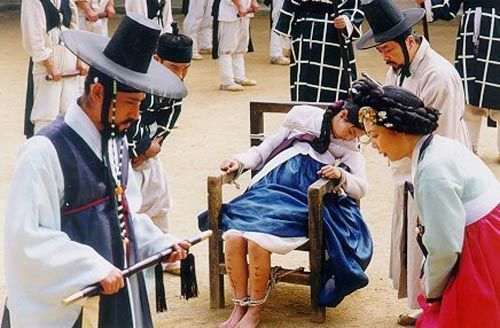
The exterior story and audience reaction to the show is rather blunt in its message about valuing the traditional arts, but rather ineffective. It undermines its message since much of the strength of this adaptation of Chunhyang comes from the cinematic interpretation, not the actual pansori performance, which is provided both in cuts to the actual performance and the audience reaction and also in voice-over narration.
For example, the point of heartbreak for Chunhyang as she reacts to Mongryong’s news about having to leave Chunhyang behind doesn’t feature the pansori singer at all and in the wake of her first winter without her husband, Im provides a visual alternative interpretation of the actual text. That the power of these moments rely on the cinematic interpretation, it renders the argument about the value of pansori null.
Im uses the pansori voice-over primarily as a transition device from the exterior narrative of the performance to the interior narrative of the Chunhyang story, and its effectiveness is hit or miss. When Mongryong’s servant Bangja (Kim Hak-yong) goes to retrieve Chunhyang, Im chooses to directly visualize the narrator’s words and the effect simply feels redundant. We are hearing and seeing at the same time and it seems unnecessary. On the other hand, a different running scene occurs where the pansori singer is narrating a conversation of some guards going to bring Chunhyang to an audience and in this scene, Im chooses to simply show the guards running, the pansori singer speaking their thoughts about Chunhyang’s uppity attitude and giving voice to what was unseen. This works.
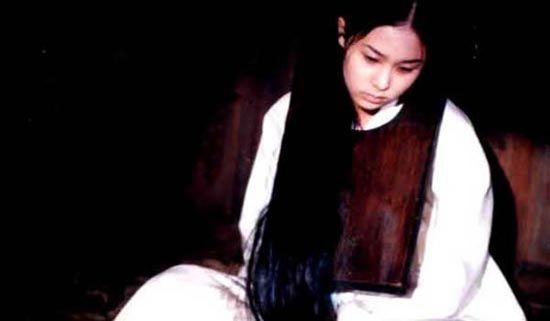
While I applaud Im for exploring this formal space, he doesn’t quite have a subtle enough hand to pull it off consistently and when he provides the collision of aural and visual redundancies, especially when the characters onscreen are speaking the same words that the pansori singer is narrating on the audio track, it simply becomes jarring, breaking the fourth wall in a rather unpleasant way.
Interestingly enough, the moments in the film that are most convincing all happen in the first half of the film as Chunhyang and Mongryong amorously initiate their marriage through and especially during the fallout when Mongryong leaves Chunhyang. In these cinematic moments, Im’s style is at its peak and even works well with the pansori voice-over. While the more intellectual critique of the abuse of power is still convincing, it’s simply a drier, less personal story and not as effective.
Although the film’s beautiful cinematography and direction highlights some of the exquisite production and art design, it also struggles with some jerky editing from time to time. The prestige that Im earned through multiple international film festival competitions seems to have given him a lot more budget to work with and it’s all up there on the screen, although the actual film stock and some of the actual crane and dolly work is still subject to Chungmuro’s limitations on the cusp of the Korean cinematic renaissance.
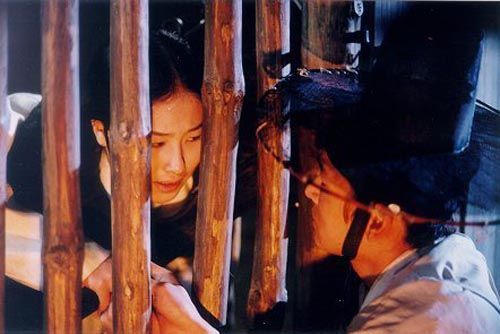
I think this all comes together to make Chunhyang a frequently beautiful and occasionally moving experience, but also a highly uneven one. Framing the story within a pansori show isn’t always effective because it sometimes results in some distractingly redundant voice-over, and the external performance, especially as the camera turns back on the audience, is overly prescriptive and rings a bit hollow. It would have worked better if we only saw the pansori performers from the perspective of the audience. As for the story of Chunhyang itself, Im presents it well, especially in the second and third acts, thanks to a healthy dose of interpretation, but for those already familiar with the tale, you’re not getting anything novel here outside of the incorporation of pansori.
A final kudo to Lee Hyo-jeong for her portrayal of Chunhyang. There isn’t much space for her to fill out the archetypal character, but she manages to convince especially as a young lover and in her moments of heartbreak.
Because of the uneven framing of the narrative in a pansori show, I hesitate to give Chunhyang a recommendation without reservations. If you don’t like pansori, you’re going to find this film unbearable and even if you do like pansori, the film’s use of voice-over sometimes works and sometimes it doesn’t. However, if you can get past the occasional unsuccessful intrusions of the pansori show into the story and can deal with the sometimes antiquated traditional story, Im Kwon-taek’s Chunhyang can still be quite an affecting couple hours. 7/10.
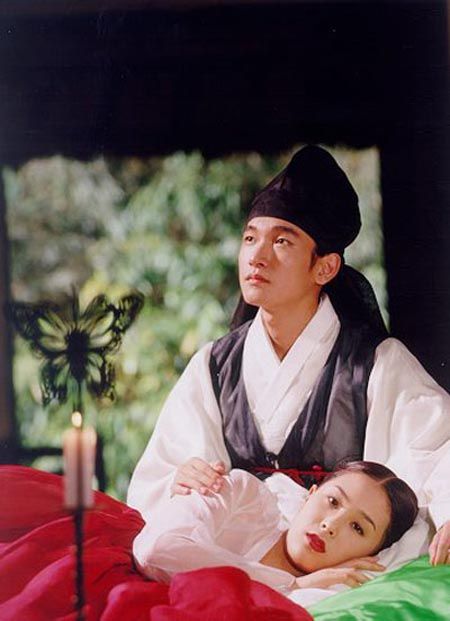
RELATED POSTS
- TV Bang-ja Chronicles is another cable hit
- Trailers and stills from TV Bang-ja Chronicles
- CGV produces a TV version of Bang-ja Chronicles
- Delightful Girl Chun-hyang: Episode 1
- Bang-ja Chronicles releases trailer
- Reworking Chyun-hyang’s folktale in Bang-ja Chronicles
- The Story of Hyang-dan: Episode 2
- The Story of Hyang-dan: Episode 1
Tags: featured

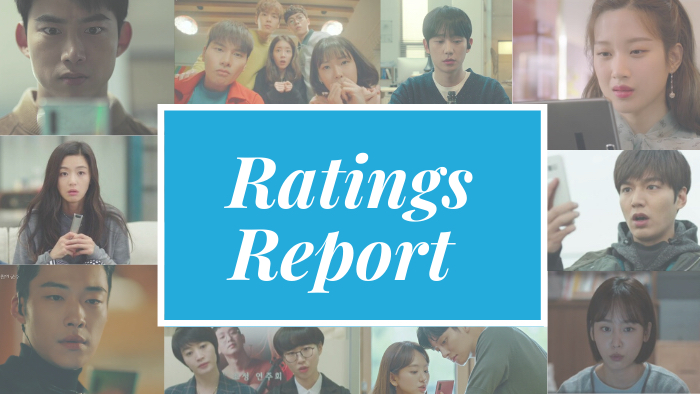
![[Rate and Review] The Winning Try](https://dramabeans.com/wp-content/uploads/2025/07/TheWinningTry_reviewb.jpg)



![[Drama Chat] Same drama, different timelines](https://dramabeans.com/wp-content/uploads/2025/08/dramachat_august302025.jpg)



Required fields are marked *
Your email address will not be published. Required fields are marked *
1 Ivoire
August 25, 2013 at 4:16 AM
Thank you so much for the movie review.
Required fields are marked *
2 Dramafed1782
August 25, 2013 at 4:22 AM
Thank you refresh_daemon. I have always wanted a review of this movie after watching the TV drama. I always feel stories like this at least manages to give a bird's eye view on Confucianism. Thank you again :)
Required fields are marked *
3 Tulipsaki
August 25, 2013 at 4:28 AM
So how The Servant turn this story on its head?
Thank you for explainingg: this is the first time the Chunhyang story clicked in my head.
Required fields are marked *
4 aceyyy
August 25, 2013 at 4:44 AM
Thanks for the review! This is the first time I'm reading one of your reviews of a movie I've seen before, and I must say suddenly the experience is a lot more accessible and less opaque.
Required fields are marked *
5 windsun33
August 25, 2013 at 5:10 AM
I do not like the format of the film, but it got me wondering why there are so few movies and TV shows that even barely criticize the idea (or quite often the perversion of) Confucianism?
I did some digging around on the internet, but I could not find a single example of any such film. Which makes me wonder - is there actual censorship about such subjects, or is it a more of a "don't make waves" type of thing?
I did find a couple of tidbits - in one instance on a TV show there was a scene that was censored out because "it showed disrespect for elders" (with no further details). Reporters Without Borders overall gives South Korea a very poor grade on censorship, citing such stupid things as banning K-pop songs that mention alchohol, while allowing dozens of TV dramas to show Koreans getting totally wasted and passing out in "family" dramas.
Required fields are marked *
6 nokcha
August 25, 2013 at 5:41 AM
I remember watching this film in a theatre in Santa Monica, the Nuart, I think, and I was sitting next to this very old halmoni. She cried throughout the whole film...I enjoyed the film very much. I had never seen nor heard pansori nor was I familiar with story. I'd never seen anything like it, and watching through my novice eyes and the grandmother crying next to me, really heightened the experience. I looked high and low for the film on dvd and finally found it several years later. Unfortunately, watching again on dvd kinda left me blah...but I won't forget how I felt when I first watched it.
Required fields are marked *
7 Newbie
August 25, 2013 at 6:04 AM
Ah, Jo Seung-woo's debut. Love this man.
I liked the pansori frame, it was my first contact with this art form and I really enjoyed the combination of Pansori and movie.
Required fields are marked *
8 snow_white
August 25, 2013 at 6:14 AM
I have seen the drama version..Delightful Girl Choon hyang and it's simply AWESOME!!
Required fields are marked *
9 CaroleMcDonnell
August 25, 2013 at 6:31 AM
I'm getting goosebumps. This was the first Korean film I ever saw (to my recollection.) I saw it in the local arthouse. It became an instant favorite and began my love of Korean culture. I cannot emphasize how important this movie is to me.
Thanks for bringing it to the attention of your readers
Required fields are marked *
10 CaroleMcDonnell
August 25, 2013 at 6:58 AM
just finished reading the review. Gotta say that i didn't mind the redundancies. The redundancies have a charm of their own and carries an almost picture book charm where ear and eye both receive information on a particular event. Redundancies in art have a long tradition in storytelling. Whether it's repetition of lines, echoes of thought, contrasting of rhythms. It's part of the joy of storytelling and whether it's Hebrew psalms, African-American preaching, a children's picture book, or a fairytale, redundancy, echoes, and repetitions are expected. Playing with redundancy in cinema is a courageous act. Especially because the modern movie audience decry excess. But if it's the filmmaker's vision, he should go with it. And if the vision manages to call our attention to the breaking of the diegesis, all the better. It's fun not only to love a story but to stand aside and to see that one is enjoying the craft of the filmmaker. So much of the fun of Chunhyang is watching the performance of the pansori, the performance of the actor, and the performance of the director. If a film can turn me into a lover of a culture and make me get totally into Korean drumming and pansori, it must've worked. At least for me.
Required fields are marked *
11 Spygurl5
August 25, 2013 at 6:59 AM
I have not seen this movie, but I don't know why the lead actor here in the screen caps kept reminding me of Kim Bum. He looks almost like Kim Bum to me.
Required fields are marked *
12 sundubu
August 25, 2013 at 7:30 AM
Thanks so much for these great film reviews! I love dramas, but I love films too and I'm really enjoying learning more about Korean films through your reviews. Please keep them coming!^^
Required fields are marked *
13 athena
August 25, 2013 at 8:09 AM
I particularly watched this pansori version in Youtube..it was very different and Joo seung Woo was very young then...Thank you for your review it made me happy that I was able to watched it and understand from your point of view.
Required fields are marked *
14 Lord Byron
August 25, 2013 at 8:18 AM
"Joseon society, a five-century-long dynasty that is the direct predecessor to modern Korea"
Correction:
It is not a "direct" predecessor. The connection was forcefully broken by the 36-year occupation of Korean Peninsula by the Japanese Empire, during which Joseon dynasty came to an end without launching a new one.
Coincidentally, the day of formal annexation (08/27) as well as liberation (08/15) occur in August.
In the US today, a campaign to keep several controversies from being white-washed by modern Japan is just beginning, regarding Dokdo Island, East Sea and Comfort Women, all of which originate from the occupation. And the global audience is beginning to pay attention to the issues.
We cannot afford to muddy the historical facts, no matter how unintentionally.
Required fields are marked *
15 Cheliwel
August 25, 2013 at 8:28 AM
Nice film. I actually watched this film after i saw Delightful Girl, chunhyang. I was curious where the series was adapted from.
Required fields are marked *
16 calgary
August 25, 2013 at 8:35 AM
whatever happened to the actress Lee Hyo-jeong?
Required fields are marked *
17 malta
August 25, 2013 at 8:49 AM
Thank you so much. This is a wonderful review. Do you know where we can find this film?
Required fields are marked *
18 bluel
August 25, 2013 at 10:37 AM
I love your reviews. Thank you for always keeping us viewers in mind!
Required fields are marked *
19 wwjaustendo
August 25, 2013 at 11:41 AM
Thanks for the review! Very informative. The images are very beautiful as well.
Required fields are marked *
20 Gwinna
August 25, 2013 at 2:06 PM
The problem with this movie is that the DVD only has subs for the dialogue, and not for the pansori.
Required fields are marked *
21 Kiara
August 25, 2013 at 3:37 PM
As always, thank you so much for the insightful review and for answering our questions and comments. I so love Jo Seung-woo and two film reviews in a row is a real treat for me :). Now I must watch this for Seung-woo and I love Korean Korean folk-tales, legends and anything related to ancient Korea. I've read many of the 3 kingdom era tales in Samguk Yusa and really enjoyed it. I also stopped eating egss after that lol.
Required fields are marked *
22 Cutesy
August 26, 2013 at 7:07 AM
I watch this movie last June of I remember right, well its totally amazing and funny also. Full of heart and Chunyang is Daebak. She is one hell of a woman.
Required fields are marked *
23 ichahan
August 28, 2013 at 11:19 AM
i watched this movie in arirang early this year (so sad they stopped their K-Movie Close Up. actually i really enjoyed the show because they aired some classic (yeah not really classic) movie like Ditto (Kim Ha Neul, Yoo Ji Tae, Ha Ji Won), Hwaeomkyung (Shin Hyun Joon), Sopyeonje, etc. actually i didn't really understand about this movie (it's basically about Chunhyang and Mongryong's love story and the annoying governor and of course Delightful Girl Chunhyang is based of this story) but it's really awesome and the guy who sang the pansori in this movie was truly great (it's rare to see some musical-like movie like this).
Im Kwon Taek PD really great!!! Jo Seung Woo also really good although he was just a rookie back then.
Required fields are marked *